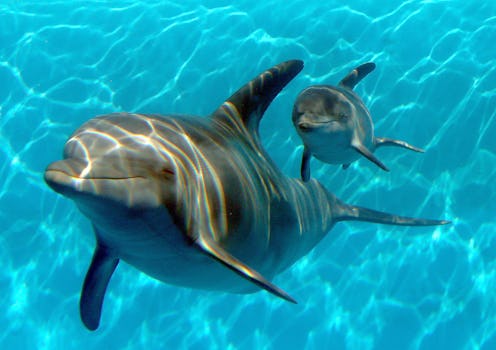News
Dolphins Are Talking & It's About Seaweed
Science, already aware dolphins are the world's best everything, has set out to translate their high-pitched whistles into a language we can understand. So far, we know that dolphins may talk to each other about seaweed. Really. "Sargassum!" one dolphin whistled to another last August, presumably during a convo about a dank type of seaweed the two were playing with at the time (we assume all dolphin sentences contain exclamation points.)
It is probably not weird that the dolphins were discussing seaweed. What was weird was that a scientist overheard and knew what the dolphins were talking about.
"I was like, 'whoa!'" the researcher in question, Denise Herzing, told New Scientist. Herzing has been tracking the dolphin pod for 25 years.
Researchers had invented whistles they introduced to the dolphins, which could then be distinguished from the dolphins' usual back-and-forth. (As everyone knows, dolphins are relentless gossips.) A translator that could pick out these new words listened to the dolphins, and ran their whistles through a database. Herzing had recorded the whistle translations herself.
One day, they had a match.
"Sargassum," announced the translator, in Herzing's own voice. The dolphin whistle-translator was developed by Thad Starner, who incidentally also helped create Google Glass.
Researchers were cautious when commenting on the study's implications. Michael Coen, a University of Wisconsin-Madison, told New Scientist:
It sounds like a fabulous observation, one you almost have to resist speculating on. It's provocative.
But because the researchers planted the term "sargassum," it's hard to know whether the dolphin knew what it was saying. Herzing, who directs the Wild Dolphin Project, elaborated on the lingering mystery to Discovery News:
The dolphins had been playing with sargassum and with each other. However, it should be made clear that the mimic of a sound does not mean that the function of that sound is understood. That comes over time with exposure to how a word is used, and this is a challenge in the wild.
The research was cut short last summer after scientists lost track of the pod. Next summer, however, Herzing wants to spend time confirming two-way communication between dolphins and humans. Eventually, the researchers hope to translate whistles from the dolphins' actual language and use that to figure out what dolphins talk about, and more about how their brains work.
Here's Herzing describing the translation device in a TED talk last year.
